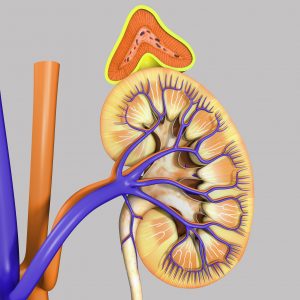 There are many factors that can contribute to high blood pressure such as being overweight, poor diet, and lack of physical activity. But there is another condition that can also lead to high blood pressure: it’s primary aldosteronism.
There are many factors that can contribute to high blood pressure such as being overweight, poor diet, and lack of physical activity. But there is another condition that can also lead to high blood pressure: it’s primary aldosteronism.
Primary aldosteronism is a hormone disorder that can contribute to high blood pressure. Our adrenal glands are responsible for producing hormones – you may be familiar with cortisol, the stress hormone secreted by these glands. Another hormone produced by the adrenal glands is called aldosterone, which balances out potassium and sodium levels.
Advertisement
Primary aldosteronism can also be referred to as Conn’s syndrome or hyperaldosteronism.
Prevalence of primary aldosteronism
It is unclear the exact prevalence of primary aldosteronism in the U.S., but estimates suggest between five and 15 percent of essential hypertension cases result in primary aldosteronism. Primary aldosteronism cases are more likely in patients with low serum potassium levels, seniors, and patients only taking a single medication for essential hypertension.
Some reports suggest the primary aldosteronism is more prevalent among African Americans. Women are more likely to have the aldosterone-producing hormone and men are four times more likely to have an idiopathic version of primary aldosteronism than women.
Causes and symptoms of primary aldosteronism
The adrenal glands produce aldosterone, but when this hormone is overproduced, our body loses potassium and retains sodium, which holds on to water. This results in higher volume of blood and, subsequently, higher blood pressure.
The adrenal glands may start producing too much aldosterone when there is a benign growth on the gland or when the adrenal gland becomes overactive. In rare cases, primary aldosteronism can be caused by a growth on the outer layer of the adrenal gland. The condition may also run in the family – although this is very rare.
Symptoms of primary aldosteronism include:
- Moderate to severe high blood pressure
- Resistant hypertension – numerous medications are required to lower blood pressure
- Hypokalemia – high blood pressure with low potassium
You should see a doctor for primary aldosteronism if you’re over the age of 45, hypertension runs in your family, you have high blood pressure that started younger than the age of 44, you’re overweight, you live a sedentary life, you smoke or use tobacco, you consume a lot of alcohol, or you have a dietary imbalance.
Complications of primary aldosteronism
Complications of primary aldosteronism include high blood pressure and low potassium levels, which can result in greater problems, such as:
- Heart attack
- Heart failure
- Left ventricular hypertrophy
- Stroke
- Kidney disease or failure
- Premature death
- Weakness
- Cardiac arrhythmia
- Muscle cramps
- Excess thirst and urination
Tests to help diagnose primary aldosteronism
Your doctor will take blood samples to test your levels of aldosterone and renin, which is an enzyme your kidneys release to control blood pressure. If levels are elevated, your doctor will run confirming tests such as oral salt loading tests, saline infusion test, and fludrocortisone suppression test.
Other tests include abdominal computerized tomography (CT) scan and adrenal vein sampling in order to detect any tumor near the adrenal gland or compare blood samples from the right and left adrenal veins. Differences will reveal overactivity in the gland.
Treatment and prevention of primary aldosteronism
The cause of primary aldosteronism will determine the treatment. One treatment option is surgical removal of the adrenal gland. This is usually the case when there is a tumor or growth present. The surgery can return blood pressure back to normal. Aldosterone-blocking medication may also be prescribed if surgery is not an option. The risk associated with aldosterone-blocking medications is that high blood pressure could return once you stop taking them.
Home remedies for primary aldosteronism
Lifestyle changes, too, can have an impact on treatment of primary aldosteronism. Since there are many lifestyle factors that can contribute to high blood pressure, it’s important to partake in healthy living habits. Some effective lifestyle habits to treat primary aldosteronism include:
- Maintaining healthy weight
- Minimizing sodium consumption
- Eating a balanced and healthy diet
- Exercising
- Reducing stress
- Not smoking
- Limiting alcohol consumption.
Advertisement
It’s not always possible to prevent primary aldosteronism, but a good practice is to always practice healthy lifestyle habits to reduce your risk of developing any illness.
Prognosis of primary aldosteronism
Prognosis of primary aldosteronism is linked to hypertension or hypokalemia. If these conditions are serious, prognosis may be fatal. If these conditions are well controlled, the prognosis is positive and a person can very well enjoy a long life.
A person with primary aldosteronism will have to be monitored for their life but that is a small price to pay to avoid complications.
